Section 239 of the Municipal Act states that all meetings of council, committees and local boards must be open to the public, unless one of the limited number of exceptions apply that allow it to be closed. These meetings are also subject to Freedom of Information requests.
“committee” means any advisory or other committee, subcommittee or similar entity of which at least 50 per cent of the members are also members of one or more councils or local boards; (“comité”)
“local board” does not include police services boards or public library boards; (“conseil local”)
“meeting” means any regular, special or other meeting of a council, of a local board or of a committee of either of them, where,
(a) a quorum of members is present, and
(b) members discuss or otherwise deal with any matter in a way that materially advances the business or decision-making of the council, local board or committee. (“réunion”) 2001, c. 25, s. 238 (1); 2006, c. 32, Sched. A, s. 102 (1, 2); 2017, c. 10, Sched. 1, s. 25 (1).
Section 238 (1), Municipal Act
Role of council
It is the role of council to ensure the accountability and transparency of the operations of the municipality, including the activities of the senior management of the municipality;
Section 224 (d.1) of the Municipal Act
Record of meeting
A municipality or local board or a committee of either of them shall record without note or comment all resolutions, decisions and other proceedings at a meeting of the body, whether it is closed to the public or not.
Section 239 (7) of the Municipal Act
Inspection of records
Subject to the Municipal Freedom of Information and Protection of Privacy Act, any person may, at all reasonable times, inspect any of the records under the control of the clerk, including minutes and proceedings of regular, special or committee meetings of the council or local board, whether the minutes and proceedings have been adopted or not;
Section 253 (1) of the Municipal Act
Procedure by-laws respecting meetings
Every municipality and local board shall pass a procedure by-law for governing the calling, place and proceedings of meetings.
Section 238 (2) of the Municipal Act
The content of the procedure by-law is generally up to the council or the local board.
Notice of meeting time and place outlined in Procedure By-Law
The procedure by-law shall provide for public notice of meetings.
Section 238 (2.1) of the Municipal Act
The procedure by-law must define how public notice of meetings is provided, but the Act does not specify what the content of the public notice requirement should be.
It should include method of giving notice and how far in advance the notice will be given:
as a best practice to promote transparency and accountability, the Ombudsman recommends that the public notice include the date, time, and place of the meeting as well as the meeting’s agenda. For example, posting an online meeting calendar for the municipality on its website would satisfy the notice requirement.
Ombudsman Ontario
Meeting agenda publication requirements outlined in Procedure By-Law
For example, the City of Belleville’s Procedure By-Law provides specifics as to how and when meeting agendas are to be distributed:
The Clerk shall cause to be delivered to each Member a meeting agenda for each Council Meeting, to the address provided by the Member to the Clerk:
- (i) in the case of a Regular Council Meeting, no less than 48 hours before the hour appointed for the holding of such meeting; and
- (ii) in the case of Special and In Camera Council Meetings, no less than 24 hours before the hour appointed for the holding of such meeting.
In preparing a meeting agenda, the Clerk shall consult with the Mayor and the Chief Administrative Officer, and shall reflect the direction of the Mayor and the Chief Administrative Officer in finalizing the meeting agenda.
With the approval of the Mayor, the Clerk may provide a meeting agenda for a Special Council Meeting or an In Camera Council Meeting at the meeting where time constraints do not allow the meeting agenda to be delivered to the Members at least 24 hours before the hour appointed for the holding of such meeting.
As soon as possible after a meeting agenda has been delivered to Members, with the exception of agendas for In Camera Council Meetings, the Clerk shall make the meeting agenda available to the public, and shall:
Section 5.7 of City of Belleville Procedure By-Law
- (i) maintain copies of the meeting agenda in the Clerk’s office for use by the public;
- (ii) endeavour to post the meeting agenda on the City’s web site; and
- (iii) ensure that the meeting agenda is available to any of the local news media who have requested a copy of the same.
Meeting minutes publication requirements outlined in Procedure By-Law
For example, the City of Belleville’s Procedure By-Law provides specifics as to how and when meeting minutes are to be distributed:
The Clerk shall prepare and maintain minutes of all Council Meetings, to include:
- (i) the place, date and time of the Council Meeting;
- (ii) the names of Presiding Officer or Officers and record of attendance of the Members;
- (iii) the reading, if requested, correction and adoption of the minutes of prior Council Meetings; and
- (iv) all other proceedings of the Council Meeting without note or comment.
Following each Council Meeting, the Clerk shall cause to be delivered to each Member a copy of draft minutes for the meeting.
The Clerk shall maintain a record of all minutes of Council Meetings in the Clerk’s office that shall be signed by the Mayor and the Clerk upon approval of the same by Council, which with the exception of minutes of In Camera Council Meetings, shall be available for public viewing.
Section 5.8 of City of Belleville Procedure By-Law
What are the exceptions to open meetings?
Discretionary
The meeting may be closed if the subject matter being considered is the:
- Security of the property of the municipality or local board
- Personal matters about an identifiable individual, including municipal or local board employees
- Acquisition or disposition of land by the municipality or local board
- Labour relations or employee negotiations
- Litigation or potential litigation, including matters before administrative tribunals, affecting the municipality or local board
- Advice that is subject to solicitor-client privilege, including communications necessary for that purpose
- A matter in respect of which a council, board, committee or other body may hold a closed meeting under another Act
- Information explicitly supplied in confidence to the municipality or local board by Canada, a province or territory or a Crown agency of any of them
- According to the Ontario Ombudsman, before relying on the exception for information supplied in confidence, the Municipality should confirm with the third party whether or not the information was supplied in confidence, and, where appropriate, inquire into what concrete harms could be expected if the information was disclosed publicly.
- Trade secret or scientific, technical, commercial, financial or labour relations information, supplied in confidence to the municipality or local board, which, if disclosed, could reasonably be expected to prejudice significantly the competitive position or interfere significantly with the contractual or other negotiations of a person, group of persons, or organization
- Trade secret or scientific, technical, commercial or financial information that belongs to the municipality or local board and has monetary value or potential monetary value
- A position, plan, procedure, criteria or instruction to be applied to any negotiations carried on or to be carried on by or on behalf of the municipality or local board.
- Education or training
Mandatory
A meeting or part of a meeting must be closed to the public if the subject matter is:
- Request under the Municipal Freedom of Information and Protection of Privacy Act, if the council, board, commission or other body is the head of an institution for the purposes of that Act; or
- Ongoing investigation respecting the municipality, a local board or a municipally-controlled corporation by the Ombudsman appointed under the Ombudsman Act, an Ombudsman referred to in subsection 223.13 (1) of this Act, or the investigator referred to in subsection 239.2 (1). 2014, c. 13, Sched. 9, s. 22.
What are closed session “in-camera” meetings?
In-camera meetings are confidential, closed session meetings that can only occur if they meet one of the exemption requirements listed above.
When they go into closed session, municipalities must first pass a resolution in open session, stating the fact of the closed meeting and the general nature of the matter to be discussed. The resolution should also include the exception cited. Afterwards, they should report back in open session on the general nature of the discussion.
The Ombudsman recommends that committees ensure that its minutes provide an accurate record of the in camera discussion, including by providing a description of the substantive and procedural matters discussed.
Municipalities typically only record the minutes for in-camera meetings, and do not typically record audio or video as any notes, recordings, etc. of a closed session meeting would become a “record” for the purposes of the Municipal Freedom of Information and Protection of Privacy Act (“MFIPPA”) and subject to release.
In 2019-2020, there were 25 Ontario municipalities had implemented either audio or audiovisual recordings of their closed meetings, providing a clear and accessible record for closed meeting investigators to review.
All municipalities are required to have a closed meeting investigator, which acts as an independent body to review the legitimacy of in-camera discussions if someone files a complaint.
Why are open, recorded meetings important?
Transparent decision-making processes may be seen as part of foundation of the good municipal governance.
The judges on the 2007 Supreme Court case, London (City) v. RSJ Holdings Inc. noted “the public’s demand for more accountable municipal government” and stated that open meetings are essential to “robust democratic legitimacy” of local administrations. They also observed that section 239 of the Municipal Act, 2001 “was intended to increase public confidence in the integrity of local government by ensuring the open and transparent exercise of municipal power.”
The Ontario Ombudsman recommends that all municipalities make audio recordings or video recordings of all meetings – both open and closed – to ensure a thorough record.
More: Meeting video recordings and archives are optional in Ontario
Closed meeting requirements
When a municipality decides to close a meeting or part of a meeting, it has to comply with:
- Municipal Act, 2001 requirements
- Additional requirements of its Procedure By-law, which it must have according to Section 238 (2) of the Municipal Act.
To accomplish this, it must:
State by resolution in open session the general nature of the matter to be considered
The council or committee must state by resolution in open session that a closed meeting will be held and provide the general nature of each matter to be considered at the closed meeting. The resolution authorizing a closed meeting must be made in advance and the public must be able to observe its passage in real time (even if the meeting is being held electronically).
Before holding a meeting or part of a meeting that is to be closed to the public, a municipality or local board or committee of either of them shall state by resolution,
(a) the fact of the holding of the closed meeting and the general nature of the matter to be considered at the closed meeting; or
(b) in the case of a meeting under subsection (3.1), the fact of the holding of the closed meeting, the general nature of its subject-matter and that it is to be closed under that subsection.
Section 239 (4) of the Municipal Act
See: Ombudsman Investigations regarding resolutions of closed meetings
Not take a vote, with exceptions
Section 239 (5) (6) state that a meeting shall not take a vote while closed to the public, unless:
- it falls under one of the mandatory or discretionary exceptions allowing a meeting to be closed, and
- the vote is for a procedural matter or for giving directions or instructions to officers, employees or agents of the municipality, local board or committee of either of them or persons retained by or under a contract with the municipality or local board.
See: Ombudsman Investigations regarding voting in closed sessions
Minutes must be recorded
A municipality or local board or a committee of either of them shall record without note or comment all resolutions, decisions and other proceedings at a meeting of the body, whether it is closed to the public or not.
Section 239 (7) of the Municipal Act
All resolutions, decisions and other proceedings that take place must be recorded, whether the meeting is open or closed. The Act does not require municipalities to create verbatim transcripts of meetings, but minutes should be more detailed than just a list of resolutions. [source]
See: Ombudsman Investigations regarding meeting minutes of closed meetings
What are the best practices for closed meetings?
The Ontario Ombudsman recommends:
- Give adequate advance notice – Meeting agendas should clearly identify any closed sessions and the reasons for them, and should be made available to the public in advance. The Municipal Act requires municipalities to establish a procedure by-law that provides for public notice of meetings, but the Act does not specify the notice content. This should be set out in the municipality’s procedure by-law.
- Pick the right exception – Make sure the exception under which the meeting is closed is identifed, and appropriate.
- Record the meeting – Closed session minutes should include place and time, attendees, a description of all matters discussed, and any motions or votes. The Ombudsman also recommends audio or video recording all closed meetings.
- Pass a clear resolution – Authorize the closed session by making a resolution during open session that includes meaningful information about the issue to be discussed behind closed doors.
- Stay on topic – While in closed session, ensure that the discussion does not stray from the matters authorized in the resolution to close the meeting.
- Vote with caution – Voting in a closed meeting is only allowed for procedural reasons or to give directions or instructions to staff and others identified under the Act.
- Report back publicly – After a closed session, report publicly in open session on what occurred, giving as much detail as possible. Although there is no requirement under the Municipal Act, 2001 for municipal councils to report back in public after the conclusion of a closed meeting, the Ombudsman recommends this practice to increase transparency of the closed meeting process.
Best examples of closed meeting in meeting minutes
Guelph
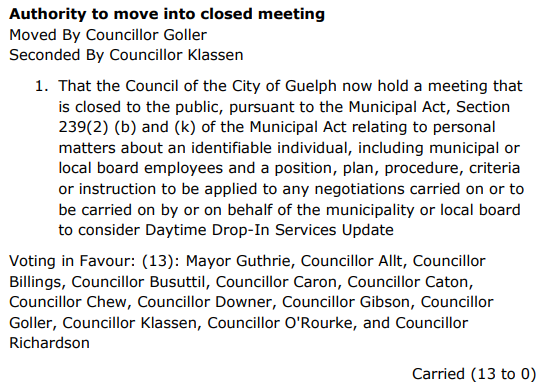
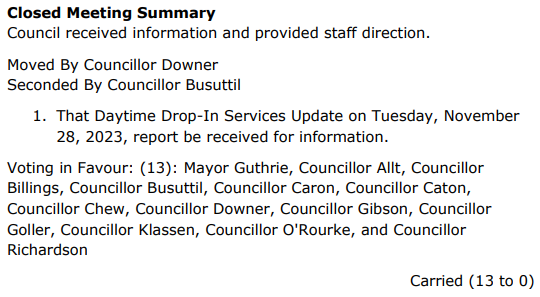
Examples of improperly closed meetings
Here are the previous reports, cases and submissions investigated by the Ombudsman.
Some examples include:
- Failing to provide sufficient information about the general topic of discussion in its resolution to proceed into closed session. Council did not provide sufficient information about the general topic of discussion in its resolution to proceed into closed session in contravention of the Municipal Act. Sables-Spanish Rivers
- Council did not verify that that the information to be provided by attendees met the requirements for a closed meeting. Hospital representatives agreed to speak to council in camera, which Council approved, but they did not take steps to review the information they were prepared to share ahead of time and confirm that it fit within the exception. The decision to close a meeting to the public rests with council, not other participants. Haliburton
- Informal gatherings of council & staff can count as a meeting and be subject to the open meeting rules. 3 council members met with a municipal staff member in a municipal garage, which was ruled a meeting that did not comply with the open meeting rules. Morley
- Information discussed was not supplied confidentially and the reasonable expectation of harm was not clearly established.
- Not including a full description of the subjects discussed in closed session in meeting minutes. Bruce County
How to submit a complaint about a closed meeting
Section 239.1 of the Municipal Act allows a member of the public to request an investigation of a Closed Session Meeting if they feel a meeting was closed improperly.
If you believe that a municipal council meeting or part of a meeting was closed to the public improperly – ie. the reason doesn’t fall within one of the 14 exceptions – you can submit a complaint to the Ontario Ombudsman.
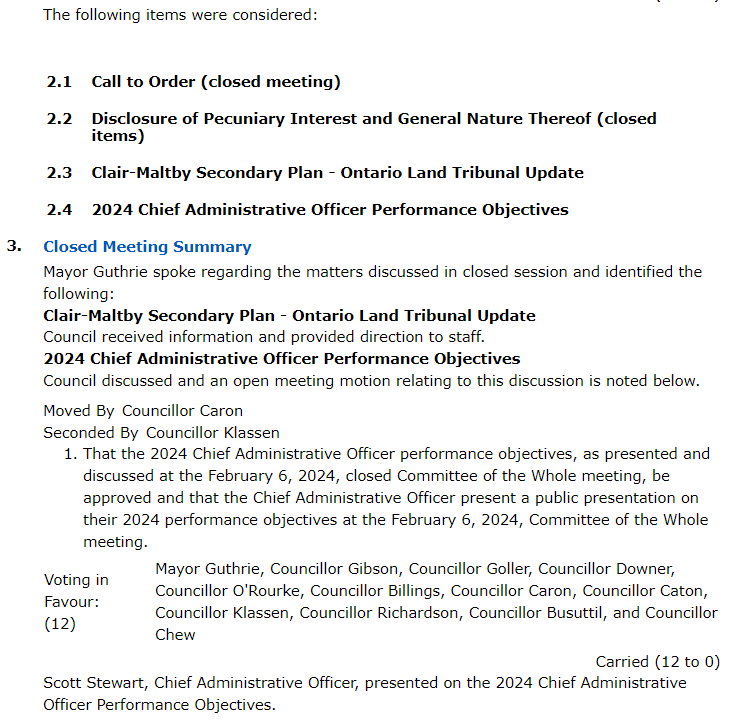
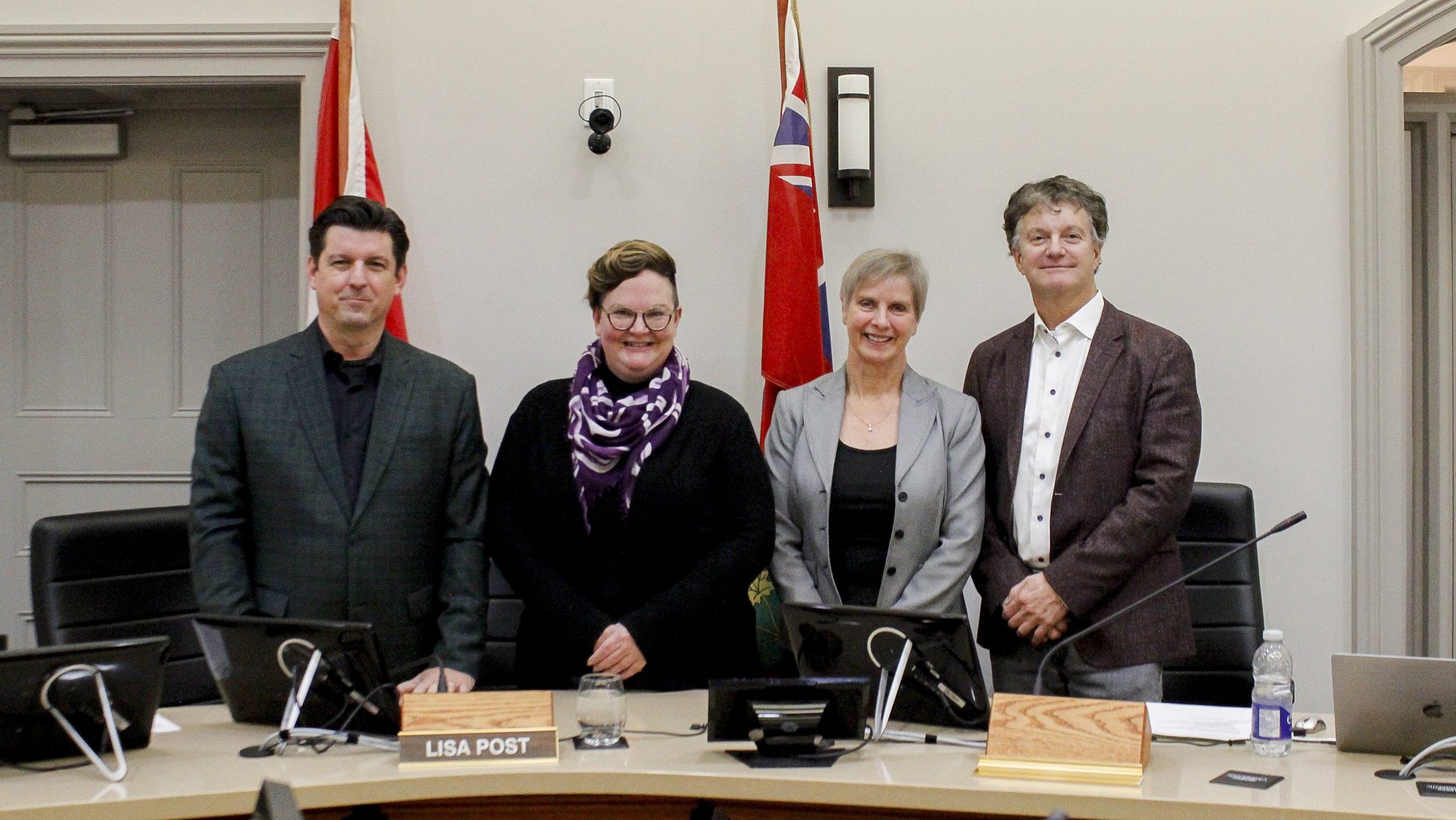
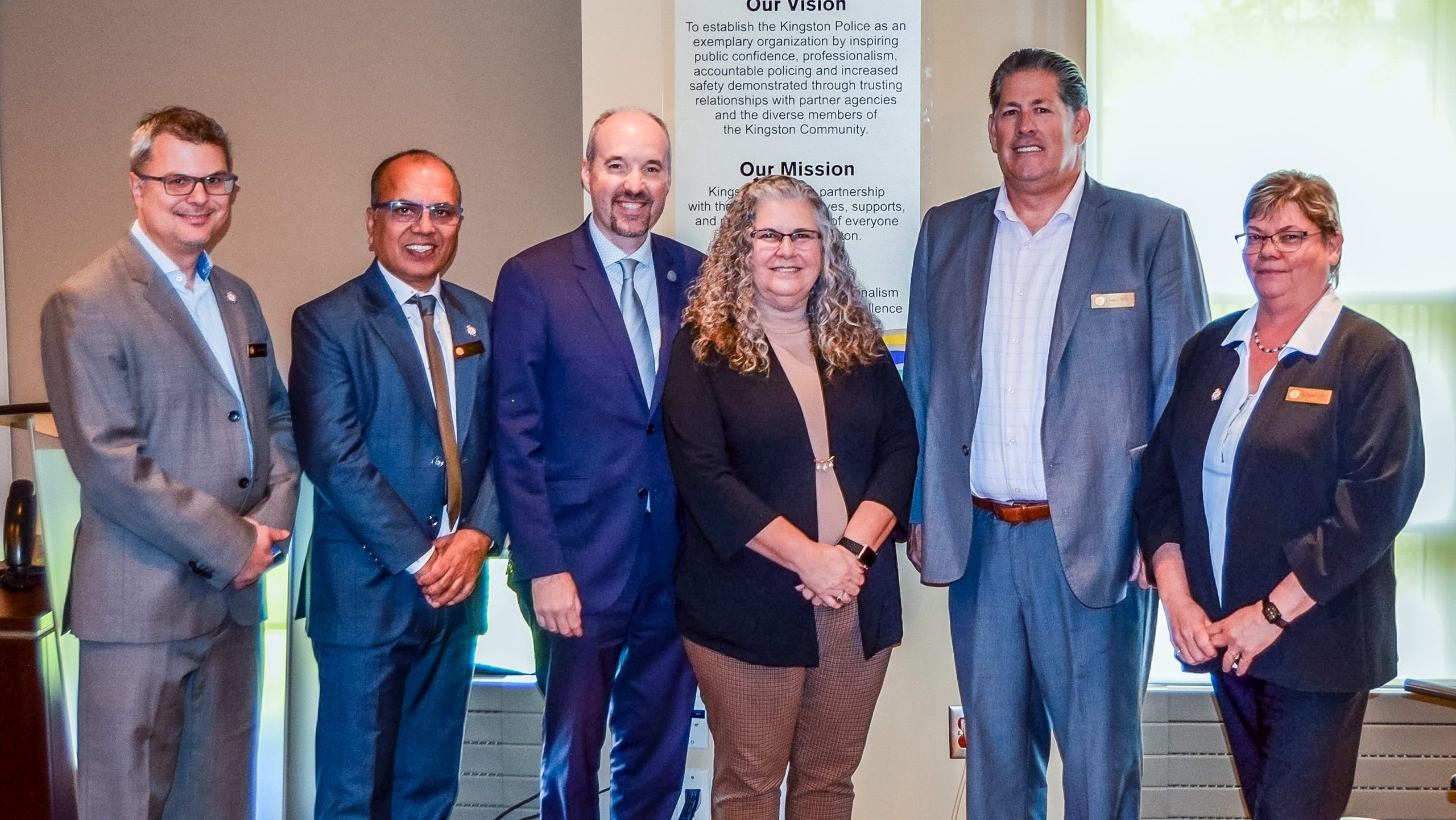
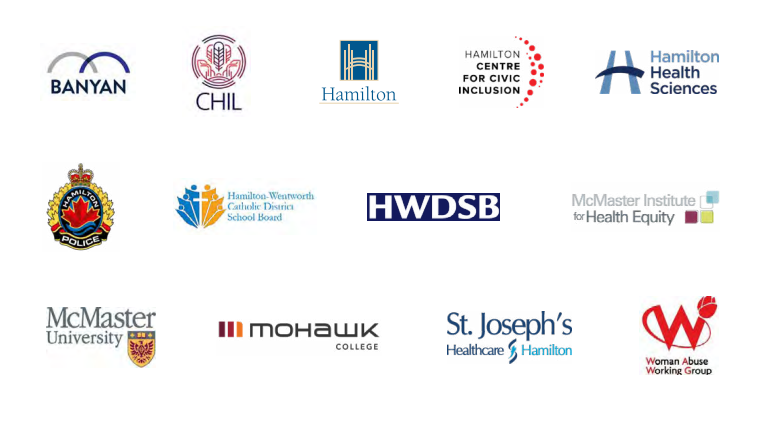
Comments
We want to hear from you! Share your opinions below and remember to keep it respectful. Please read our Community Guidelines before participating.